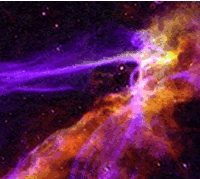It’s official, the expansion of the universe slowed down before it began to speed up. The finding confirms the idea that “dark energy” — the mysterious force that appears to be pulling space apart — did not always hold sway. For the first few billion years, gravity was king.
The key to detecting these cosmic dynamics has been a painstaking examination of distant exploding stars, or supernovae. A certain class of supernovae make excellent markers for determining cosmic distances, because there is a strict relationship between their peak brightness and the way that brightness declines over time. If astronomers measure how the observed brightness fades over a minimum of a few weeks they can calculate the supernova’s actual brightness, and thus its distance.
Observations of a few dozen such supernovae in 1998 showed that the most distant ones were dimmer than expected. That lead to the astonishing conclusion that the universe is expanding faster now that it has been in the past, instead of slowing down as everyone expected. It seemed that something was countering the attractive effect of gravity. But although most astronomers were convinced, the idea was impossible to prove. Some researchers argued that the light from the supernovae could have been obscured by dust on its way to Earth, or that the more distant stars were simply composed differently.
A team of observers has now studied 230 supernovae, including stars more than twice as far away as in those in the original study. At 7 billion light years away, the most distant ones correspond to half the age of the universe. By comparing the distances of supernovae of different ages, the researchers have now ruled out the alternative explanations for the data and have shown that the universe’s expansion initially slowed down, before it started to speed up just a few billion years ago.
As the universe expands and objects move further away from each other, gravity gets weaker, while dark energy is generally thought to stay roughly constant. So the result fits with the idea that when the universe reached a certain size, dark energy took over from gravity as the dominant force. “It’s a tremendous relief,” says Robert Kirshner of the Harvard-Smithsonian Center for Astrophysics, who presented the findings to the American Astronomical Society meeting in Nashville, Tennessee.
The
observations also match other lines of evidence suggesting that
dark energy accounts for some 70 per cent of the universe’s
mass. But it’s still anybody’s guess what the mysterious
force is —there are “about 600” competing ideas,
says Kirshner. To start weeding out contenders, the next step is
to expand the search to greater distances, using more detailed measurements.
Kirshner’s team is currently analysing data on 45 more supernovae,
gathered by the Hubble Space Telescope.


